Celebrated annually each February, Black History Month presents an opportunity for communities to honor and reflect upon achievements made by African-Americans throughout U.S. history. In recognition of this important month, Scripps Institution of Oceanography at UC San Diego is celebrating the incredible contributions of our Black faculty, staff, and students.
UC San Diego and Scripps Oceanography are working to strengthen support for our Black campus community. Over the past few years, Scripps has made strides to improve equity, diversity, and inclusion (EDI) efforts on campus, hiring Keiara Auzenne as its first Director of Diversity Initiatives in 2016. With the funding from the Vice Chancellor for Equity, Diversity and Inclusion, Auzenne then developed the Community Engagement Graduate Fellows Program and assisted in the recruitment and welcoming of Scripps’ first graduate student to take advantage of the UC-HBCU Initiative. In the fall of 2019, Scripps welcomed four new faculty members to campus, including Amina Schartup, an assistant professor in the Geosciences Research Division and Scripps’ first Black tenure-track faculty member.
We caught up with several members of our Black campus community for a candid discussion about the significance of Black History Month, what can be done to make the STEM fields more inclusive, advice for the next generation of Black scientists, and more.
UC San Diego has a number of events and activities scheduled this month to recognize Black History Month. Visit the Black History Month 2020 website to learn more.
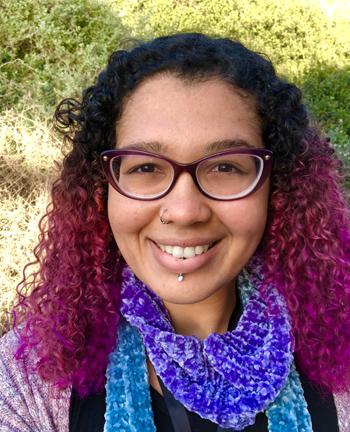
Danielle McHaskell | PhD Student
What is your role at Scripps?
I have just started my first year in the PhD program as a marine biology graduate student in Dr. Jennifer Smith’s lab at Scripps. I am interested in studying invasive seaweeds which are anthropogenically transported locally from other regions and may compete with native species altering community composition. I am curious to see how our native algal assemblage may change in response to invaders and to understand the mechanisms that allow for invasion success.
What does Black History Month mean to you?
As a Black person that is also biracial, I identify as a mix of African-American and European-American with a set importance on this distinction to ensure that I address unearned, light skin privileges while also addressing my affiliation with Blackness. Although I celebrate Black culture all year long by delving into Black literature and supporting my family and community, Black History Month is a time where I put emphasis on cultivating a space for self-growth and self-love while also making it a point to use my privilege to raise awareness of contemporary obstacles in African-American culture. In school, all we’ve ever been taught is white history so Black History Month is a time for others to take the time to learn Black history which can lead to a better understanding of Black culture today. This knowledge can be used to bridge gaps ultimately allowing for true allyship, inclusion and a cohesive scientific community.
Do you have any mentors or role models who’ve helped shape your life or career path?
Of course! The role model I look up to the most is Dr. Ayana Johnson who happens to be a Scripps alumna. When I was applying to the Scripps PhD program for the second time, I stumbled upon a podcast in which a comedic host interviewed Dr. Johnson with questions regarding the state of our ocean which led to explaining the impacts of overfishing, plastic pollution and climate change. Not only did I get to hear and see a woman with a similar culture to mine, but she earned a PhD at my dream school and worked with the PI I aspired to work with. I messaged her asking for advice and her encouraging response kept me motivated during a time of immense self-doubt and limited support leading to an acceptance into Scripps and a position into Dr. Smith’s lab!
How do you feel about the current representation of Black scientists in your field?
I didn’t know marine science was an option until a few years into college and didn’t really feel that there was space in this field for me until learning of Dr. Johnson. She was the first Black marine scientist I had the opportunity to see. To some people, it may be inconceivable to have spent 26 years of their life without seeing somebody that looked like them working in a position similar to what they were aiming for. It is very difficult to envision yourself in a position when nobody there looks like you; it makes you feel unwelcome and like you don’t belong. This presents yet another barrier that prevents Black youth from pursuing marine science as a career. In order to improve this, we need outreach events that create the opportunity for Black youth to meet and talk with Black scientists so that they can envision themselves in these positions and know this field of study is an option.
What advice do you have for the next generation of Black scientists?
Unlearn the fear of asking for resources whether it be extra help with an assignment or a research opportunity; you deserve the extra help just as much as everybody else. If you receive a no, the second piece of advice is persistence. Check in every week or every month because sometimes new opportunities arise. Next, find a support group that can check up on you and encourage you when you feel defeated. Lastly, do not give in to negative self-talk and don’t be too hard on yourself. People won’t always be your ally and sometimes you have to rely on yourself for support.
What still needs to be done to make the STEM field more inclusive?
Although this first point may relate more to equity: Access to resources. Infrastructural racism woven into society during the birth of this country limits Black families fiscally while other groups benefit. Therefore, youth from the Black community do not have access to the tools necessary (e.g., tutors, computers, extracurricular activities) to be successful in STEM. Second, campus-wide, mandatory cultural competence training with initial focus on understanding how to prevent and intercept microaggressions so that everyone can feel respected and valued in the scientific community.
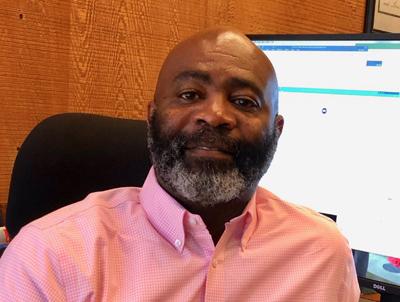
Wayne Farquharson | Staff
What is your role at Scripps?
I’m the Chief Administrative Officer for the Earth Section: Geosciences Research Division (GRD) and the Institute of Geophysics and Planetary Physics (IGPP). My role is to provide administrative leadership to the business office. The business office supports the academics in pursuit of their research activities. Our goal is to minimize the administrative burden on the academics, allowing them to focus on their research while maintaining our fiduciary and safety responsibilities in a healthy welcoming work environment.
How long have you been at Scripps/UC San Diego?
I started at UC San Diego in 1987 and transferred to Scripps in 1991, as a member of the PORD business office, which is now the department of Climate, Atmospheric Sciences, and Physical Oceanography (CASPO). I transferred to the IGPP business office in 1996. About six years ago the IGPP and GRD business offices merged and became the Earth Section business office.
What do you enjoy about your work?
The gorgeous location and relaxed atmosphere. There is no such thing as a routine day. It’s a challenge as our academics are always exploring new ideas which do not always align with current policies or guidelines. It’s rewarding when you can figure out a solution that helps the academic but keeps us compliant with the policies.
What does Black History Month mean to you?
Black History Month doesn’t mean a lot to me. Black History encompasses all history, so you can’t confine Black History to a single month.
Do you have any mentors or role models who’ve helped shape your life or career path?
My mom is my role model. She is the most selfless person I know. She continues to make personal sacrifices to help others. She taught me to love God and my family and treat others with respect and kindness. Her work ethic is phenomenal and I’ve tried to follow in her footsteps.
I had several mentors during my tenure at UC San Diego/Scripps. My first mentor was the late Thyra Fleming. She was a MSO here at Scripps and encouraged me to come to Scripps. Thyra was instrumental in helping me carve out my career path. She would always remind me not to be complacent and that learning is a continuous process. She would always tell me, “You need to be prepared/ready for the next step.” Unfortunately, Thyra passed away before I reached my goal, but I’m forever grateful and appreciate the role she played in helping me achieve my goals.
My other mentor was the late Christina Seabern. Christina was my MSO at IGPP. She picked up where Thyra left off. She helped me to see and understand the big picture. For example, from very early she helped me to understand IGPP’s role within Scripps, Scripps’ role within UC San Diego, and UC San Diego’s role within the UC system. Understanding these roles helped me to make better decisions when carrying out my duties as my thought process was not limited within the borders of IGPP. She also taught me how to navigate the politics of an academic institution and the importance of developing a professional network. I admired her calm demeanor, her ability to listen, her openness to others' opinions, and her approach to work-life balance.
What still needs to be done to make the STEM field more inclusive?
Eliminate the disparities in K-12 education.
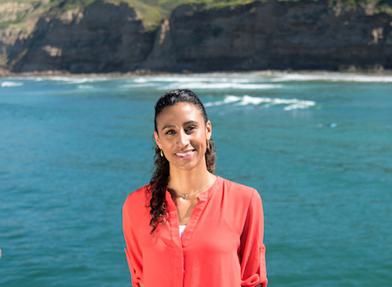
Tashiana Osborne | PhD Student
What is your role at Scripps?
During my time as a Scripps PhD Candidate and beyond, I strive to contribute to research involving weather extremes, help empower younger students, and share science with broader audiences. Through a National Science Foundation Fellowship, I focus on radar-detected rain and snow storms associated with atmospheric rivers (rivers in the sky!), and their implications for safety and water resources. In addition to research opportunities, I pursue science policy and community engagement experiences. Most recently, I've shared initiatives focused on Sustainable Development Goals internationally at United Nations Climate Change Conferences, advocated for responsible, science-informed policy decisions as an American Geophysical Union Voices for Science Advocate, and interacted with classrooms across the U.S. through the Skype-A-Scientist program.
What does Black History Month mean to you?
Black History Month (and every month) is a great time for all to be reminded of the extraordinary strength, sacrifices, and perseverance of both well-known and unsung Black heroes of the past and present. It's time to acknowledge and honor their significant contributions that went into building the U.S. and other nations to become better places for many; civil and political rights, STEM innovations, arts, and more. It's even a time to celebrate culture, and remember that Black History started before slavery. It's time to think about how we can all build on allyship and compassion, and how we can, together, take steps toward stronger and more equitable communities.
How do you feel about the current representation of Black scientists in your field?
To this day, the percentage of Black scientists in physical sciences such as earth sciences is notably smaller than the percentage of Black adults in the United States alone. The numbers are even more alarming when considering Black scientists actually promoted to leadership positions. Underrepresentation starts early on as complex issues involving access, and discriminatory structures and behaviors negatively affect young school children and their families.
I hope to see not only the numbers improve, but also see the quality of inclusion and support-focused initiatives improve. We can celebrate and express gratitude for the progress made up to this point while also advocating for solutions to problems existing today.
Do you have any mentors or role models who’ve helped shape your life or career path?
I find inspiration and strength by learning from the perseverance of loved ones, ancestors, and others from various walks of life. I've also been inspired by Toni Morrison, Katherine Johnson, George Washington Carver, Dr. King, Nelson Mandela, Maya Angelou, and Michelle Obama.
Gillian Bowser, Diane White Husic, Nate James, and Dawn Wright teach me to lead with purpose and imagination. Anna Wilson, Amin Dezfuli, Ben Hatchett, Myrl Hendershott, Joel Norris, Art Miller, and others have helped me grow in STEM in meaningful ways. I’ve also been shaped by K-12 educators and additional mentors from St. Cloud State, NASA, Scripps, and elsewhere.
What advice do you have for the next generation of Black scientists?
It will be important to build on a deep-rooted sense of your value and worth, find supportive communities and individuals, seek and receive support when you need it, and remain focused on your short and longer term visions. In addition to those, I'd suggest finding ways that work for you to draw on inspiration and peace of mind. Please remember: There is a place for you in STEM or whichever field you choose!
What still needs to be done to make the STEM field more inclusive?
​We all need productive conversations that build on education, awareness, growth, and emphasize developing and following through on appropriate action plans. As a STEM community, we may all be best served by learning from social psychology and sociology-based trainings and strategies. This might mean first opening space for diverse voices to be heard and valued, and taking a critical look at cracks in structures that must be addressed for collective advancement.
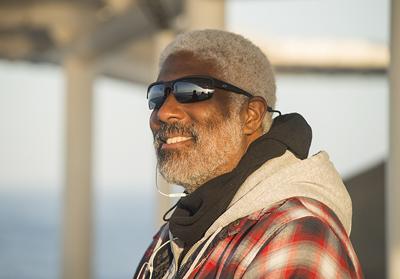
Eric Archer | Adjunct Professor
What is your role at Scripps?
I am an adjunct professor in marine biology as well as an alumnus of Scripps. I work at the NOAA Southwest Fisheries Science Center in the Marine Mammal Genetics Program. My work focuses on clarifying questions about the taxonomy and population structure of whales, dolphins, and porpoises as it relates to management and conservation issues. I also mentor Scripps students and teach an annual course at Scripps on programming in R as well as give guest lectures on analytical topics and marine mammal genetics.
What does Black History Month mean to you?
I see it as an opportunity to reflect on the contributions and accomplishments of African-Americans in our society. Given the history our culture has had in this nation, I think it is important to take a chunk of time to remember those that have paved the way for us. It helps to remind us of the sacrifices that have been made, battles that have been fought and won, and the debt we owe to future generations. Without this recognition, we risk forgetting that we have been equally influential in the building of this society and deserve a seat at the table.
Do you have any mentors or role models who’ve helped shape your life or career path?
I have been lucky enough to have had several quality mentors. Those that made the biggest difference were the ones who took the time to sit down and teach me, help me think through problems, point me to resources, and let me fail and recover gracefully. They gave me the space to let me grow into the potential in me that they saw. I’ve learned that it is the rare person who succeeds that doesn’t have at least one person like this in their lives. My hope is that we can all see this and try to be that person to those coming behind us.
How do you feel about the current representation of Black scientists in your field?
I find it quite depressing. I rarely meet other Black marine biologists, and if so, it is usually because they are Black and someone has introduced us. Although I have been in the field for over 25 years, I do not personally know of another African-American marine mammalogist. However, I know that I can’t be the only African-American interested in the field. I’m not special, just extraordinarily lucky. If we are going to have the society we dream about, it is critical to work out how we open the pipeline to let more people explore and cultivate curiosity.
What advice do you have for the next generation of Black scientists?
The most important thing to know is that the path that everybody takes is unique. I know it can be hard, but do not get caught up in the thought that there is a single path to your goal, and missing some step means failure. Each person will have to carve it out for themselves. It may not be easy. Some will have to do more carving than others. Regardless, know that there is a place for everyone who really wants to do the work.
One way to find that place is to identify what unique perspective you bring and capitalize on that. Don’t get fooled by the idea that the perspectives you see in the field now are the only ones that work. Your differences make you better and more useful than a mass of people who all think the same way.
Finally, remember your passion. What excites you about science and the field you’ve chosen is what will keep you chugging through the hard times.
What still needs to be done to make the STEM field more inclusive?
I don’t think there is a single answer to that. There are issues at every level in the education and social system that if addressed will help open the pipeline wider. I’d like to see more effort put into exposing a wider variety of K-12 students to a wider variety of STEM fields. I see a lot of effort being put into high-profile STEM fields like engineering, computer science, and biotech, however. It would be good if more students knew that they can actually make marine biology a career option and there are many different avenues in that field alone to go down. There are other issues of acceptance and implicit bias that will have be fought along the way, but if we can plant the seeds of getting a more diverse group interested, it will go a long way towards changing the face of the field.
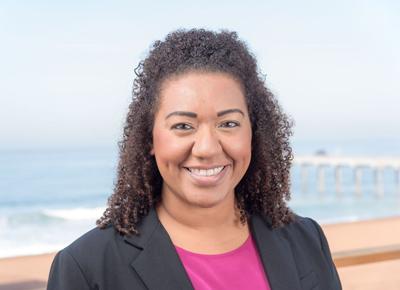
Melissa Borges | Staff
What is your role at Scripps?
I am the Development Donor Programs and Events Manager at Scripps. I’ve been with UC San Diego for six years and with Scripps for two years. I work in the Development Office focusing on donor relations and specifically development events. I love working at Scripps as it connects to my personal passion of conservancy and protecting the planet. I may not be a scientist but with my expertise I am able to support conservancy efforts by supporting fundraising efforts through events and donor programs.
What does Black History Month mean to you?
Black History Month is a celebration of the culture, struggles and beauty of people in America of African descent. It’s a time to reflect on the progression that has been made in the American Black community as well as focus on the work that is still required to continue moving the community toward equality. As an American Afro-Latina, Black History Month is something I’ve only recently started identifying with. As the Afro-Latin community in America continues to grow, it’s wonderful to see more representation in media, entertainment, and academia.
What advice do you have for the next generation of Black scientists?
Don’t let anyone or anything get in the way of your dreams for success. It’s okay if you don’t fit into the mold that has been created for you by your family, community, or society. Follow your dreams and keep your eye on the prize. If you have a passion for science, research, and finding solutions to the world’s largest problems, then being a scientist is the right path for you and there is a seat waiting for you at the table. Looking or being different from those that surround you is not a reason to give up on your dreams; be the role model you needed when you were a child.
What still needs to be done to make the STEM field more inclusive?
Outreach geared toward a diverse community would be helpful (i.e. marketing, social media, etc.). Recruiting students, professors, and staff from high schools, neighborhoods, communities where the demographics lean toward minorities could be a great start. Financial support for students is key as the socioeconomic state of most minority groups doesn’t always allow minority students the opportunity to attend institutions like ours. More scholarships and support groups for the students that are here is key.



